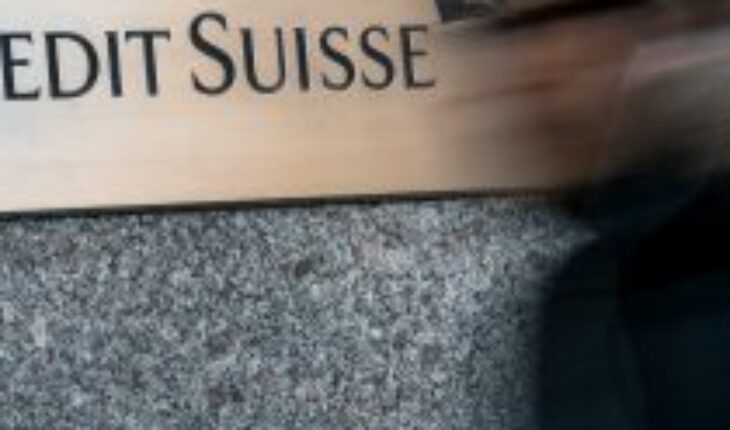Good! Tighten your belts that we are facing the possibility of a new global financial crisis that, like it or not, will hit us.
To the bankruptcy of a bank in the United States and the intervention of a second in the last week, doubts about the liquidity of Credit Suisse in Europe were added on Wednesday, which has global markets on tenterhooks, Chile included. The fear of many analysts is that we are on the verge of a financial crisis equal to or worse than that of 2008. This morning the entity accepted help from the Swiss central bank in the form of a loan of US $ 54,000 million. Credit Suisse is one of 30 banks globally deemed too big to fail.
The fear that we will have to face the worst-case scenario. Until a few weeks ago, there was consensus that global economic stability and the fight against inflation required raising interest rates much more, with all the pain that implies. But it was a necessary cost. The problem now is that the financial stability risks generated by bank runs are going to require lower monetary policy rates and that, says Roubini, practically guarantees that we are on the verge of “a great crisis”. Today the focus is on the European Central Bank’s monetary policy meeting and what it says about the crisis.
Before starting with what summons us, I want to make a special invitation to join El Semanal, and El Semanal Exprés. Take advantage of this March special offer and subscribe.
1
1- ANOTHER LEHMAN MOMENT?
What happened?. Credit Suisse, one of the world’s largest banks, had to go out on Wednesday to ask authorities for help, and the Swiss government said it would do whatever it takes not to let its financial sector down. The Swiss National Bank (SNB) came forward and assured that, if necessary, it will be provided with all “the necessary liquidity”. This morning Credit Suisse accepted the aid in the form of a $54 billion loan.
“Lehman Brothers moment.” High-profile economist Nouriel Roubini, famous for correctly forecasting the 2008 financial crisis, is one of several analysts who warned Wednesday that Credit Suisse’s (CS) failure would be similar to that of the bank that triggered the crisis 14 years ago and trigger a new global financial crisis.
Behind the run on CS is the fear on the part of investors that the bank, which surrounded all kinds of rumors months ago, would be the next to fall, after the failure last week of a bank in California and the intervention of a second. Last year the bank lost nearly $8 billion. The straw that broke the camel’s back on Wednesday was the refusal of the Saudi sovereign wealth fund – one of its largest shareholders – to put more money into a hypothetical future capital increase.
As an example to understand the magnitude of the problem: Silicon Valley Bank had US $ 150 billion in assets, Credit Suisse has US $ 700 billion and that is why it is considered a bank of systemic impact for the entire global financial system.
Impact in Chile. On Wednesday, the Chilean peso was the currency that fell the most against the dollar, closing at 830 against the U.S. currency, a drop of almost 3%. In part, because among the victims of the global debacle was the price of copper. It is anticipated that volatile days are coming and that the financial cost for emerging markets, including Chile, will increase. In volatile times there is capital flight from emerging markets to assets considered safe, such as gold, the dollar and U.S. Treasuries.
If you want to read more, take advantage of this special offer and subscribe to this newsletter.
2
2- ENERGY TRANSITION IN CHECK
What happened?. A proposal by an important group of renewable energy generators asking the Minister of Energy, Diego Pardow, to temporarily (but radically) modify the energy pricing of the Chilean electricity system, has the industry at odds and puts in check the Government’s plan to accelerate the energy transition towards a sustainable matrix.
The heart of the problem. The renewables who sign the letter have a big problem. They generate all their energy in the north and their cost is effectively almost 0, but they have contracts to provide power in the south at a certain cost. As the Aguirre transmission line won’t be ready for another couple of years, companies are forced to buy power in the south at prec.IO Spot to fulfill their contracts. The drought and war in Ukraine have caused prices to skyrocket and that results in them losing money: the prices at which they buy energy are well above the contracts they signed and this already has several on the verge of bankruptcy.
Those who know more about the subject than I do point out that the problem is even more complex. The crisis, they say, is that the current Chilean regulations are outdated. It comes from 1982 and the way in which the regulator calculates costs and then establishes certain floors in prices is totally obsolete.
The 9 renewable companies that signed the letter warn that “under the current pricing – which does not consider the units operating at Technical Minimum within the economic order, and therefore does not determine the marginal cost of energy – the restriction of Technical Minimum reduces long-term incentives for investment in renewable energies. ”
The guild of generators put the cry in the sky. They sent their own letter to Minister Pardow, warning that the proposal attacks “the fundamentals of market design contained in our current regulation” and contravenes international best practices aimed at providing incentives for investment in both renewable generation and storage. They allege it would be a 40-year rule change through a decree.
If you want to continue reading how the controversy affects the energy transition and what the experts say, take advantage of this special offer and subscribe to this newsletter.
3
3- THE TABLE: CAF WANTS TO BE THE GREEN BANK OF THE REGION
Christian Asinelli and Chile’s return to CAF: “We want to help make development more inclusive and sustainable.”
The vice president of the development bank of Latin America was this week’s guest of La Mesa de El Mostrador. A few days ago he was in Chile as part of a series of events that marked the reincorporation of the country as a full member of the institution.
The number two of the CAF says they want to be the green bank of Latin America and support member countries in a “fair” energy transition.
Asinelli adds that the goal is for this transition to help fight poverty and inequality. He emphasizes that CAF already provides more in the region than the World Bank and that Chile’s return is a historic milestone.
And he reveals that, at the request of La Moneda, they are already working with the Treasury to see how to help in the decentralization process that Boric wants to promote.
To watch the full interview click on this link or the image above.
4
4- NO CLEATS OR TIES, EXPRESS
– What is talked about at the money tables: if the INE data is being leaked. It has been commented for at least 4 months in some of the money desks that operate the most in the local market and the focus is the publication of CPI data and to a lesser extent the sectoral figures. Among those who are talking about the issue are banks, brokers, insurers, AFPs and some foreign institutional funds.
“If you get an IPC very different from what the market anticipated and you see that someone bet and achunted him, it’s a rare sign,” says a trader with long years leading one of the largest money desks in the market. Another source who knows the subject well points out that, before putting the chips, the market looks at the expectations of the Central Bank and that of operators. The latter, says the same source, have a better sense of smell than economists. “The economists in banks and brokerages are very academic. The operator puts money and is sharper and they have more street, “he says.
Of course, there is no unanimity among operators that “something strange” is happening and there are few who believe that there is an organized filtration. Rather, they point to possible oversights in the processes. Others claim that the greater volatility in the fixed income and peso/dollar market, added to the surprises in the numbers, attracted traders willing to take greater risks and make greater bets in the run-up to the publication of the figures.
If you want to read more, take advantage of this special offer and subscribe to this newsletter.
– Francisco Saffie comes to give Marcel a hand to try to save the tax reform. This is the ambassador of Chile to the OECD in Paris and who the Minister of Finance asked to come for a few weeks to the country, in order to assume the leadership to bring the process to fruition and lead the dialogues with entrepreneurs, unions, SMEs and workers.
The tax expert is close to Finance Minister Mario Marcel and was an advisor to the finance ministers of Michelle Bachelet, Alberto Arenas and Rodrigo Valdés. He also advised Gabriel Boric and Giorgio Jackson when they were deputies.
Last year, on the eve of the announcement of the Government’s project, Saffie participatedor in a workshop organized by El Semanal de El Mostrador. There he explained the urgency of a tax reform, since, he said, “there is no country that has developed with the level of tax collection of Chile.” To see the full program, click on this link.
This week Fitch, the rating agency, warned that the rejection of the tax reform adds to the constitutional uncertainty in Chile. The report warns that President Gabriel Boric’s reformist agenda implies increased spending on pensions, health and education and, without reform, there would be pressures on deficits and spending. And he warns that, if no agreement is found, the lack of reform could put pressure on the sovereign classification.
– Inflation above 100% opens a space for a Trumpist presidential candidate in Argentina. The warning is from Bloomberg and is published after it was learned that in February annual inflation reached 102.5%, the highest variation in 32 years. The data set off alarms that the economy will fall into a situation of “hyperinflation” out of control, in the midst of a deeply polarized and crisis political class. And there is an opportunity for Javier Milei in the face of the frustration of the population with the political class and that none of the traditional blocs has been able to fix an economy that is sinking more and more.
Polls now give Milei 17%, but Bloomberg says his message of blowing up the system resonates with a frustrated and angry population. “With 40% of the population mired in poverty, Milei presents himself as a savior (…). Their responses to the malaise are correspondingly dramatic and include swapping the Argentine peso for the U.S. dollar as the national currency and drastically cutting government spending. He even suggested burning the central bank,” the analysis says.
5
5- LAST WEEKS OF AN UNMISSABLE PROPOSAL
Click on the image to take advantage of the offer
This March El Semanal helps you take care of your wallet with a special offer. So if you received this newsletter from a friend or colleague and you are tired of missing the news that moves the markets, the economy and that are an obligatory topic in the corridors of power, take advantage of this offer and do not miss it.
And this year El Mostrador Semanal is tastier than ever. Every Sunday and Thursday straight to your inbox. And you can also participate at no cost in the workshops and special events that we will carry out this 2023.
Our newsletter is designed for those who are clear that to understand the new Chile you have to know how money moves.
So why wait? There is an increasingly complex world and we help you decipher it.
Subscribe today and take advantage of a 50% discount on the annual plan*.
That’s as far as we come this week. I hope you enjoyed this edition as much as I did. Before closing, remember that if you have any comments or information to share with us, write to me at ivan@elmostrador.cl or on my networks.





